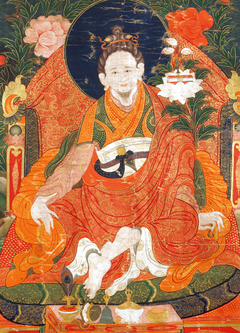Instruction for Repairing Impairments and Breakages
Pith Instruction for Repairing Impairments and Breakages
revealed by Jigme Lingpa
Homage to the deity of naturally arising awareness!
When engaging in the profound practices of approach and accomplishment,
If there is a possibility that there are some impairments and breakages of samaya
Relating to the guru from whom you have received empowerment,
This can rob you of the fruits of the practice—
Thus apply the following crucial pith instruction.
Consider that the guru from whom you have received empowerment and transmissions
Is the embodiment of all the buddhas
And visualize him or her on the crown of your head.
While maintaining the four powers,[1]
Recite three times the Yeshe Kuchok prayer,
Which conveys the meaning of The Rampant Elephant Tantra,
And the hundred-syllable mantra as much as possible.
Finally, recite the vowels and consonants and the mantra of the essence of interdependent origination.
Then, the guru at your crown instantly transforms
Into the form of whichever yidam deity you are practicing.
Receive the four empowerments and recite the root mantra.
The yidam melts into light and dissolves into you.
You yourself merge into an inexpressible experience of appearance and emptiness,
And settle in the naked state that is beyond thought.
Thereafter, impairments, breakages or malice
Should never again be permitted to taint your mind.
This is the most crucial pith instruction,
Imparted as the blessings of the wisdom-transmission
Of the guru who embodies all buddha families and the three kāyas.
Instil it in your heart! Samaya.
| Translated by Han Kop and edited by Barry Cohen, for the Longchen Nyingtik Project, 2024.
Bibliography
Tibetan Edition
'jigs med gling pa. "klong chen snying thig las/ nyams chags skong ba'i man ngag" in klong chen snying thig rtsa pod. New Delhi: Shechen Publications, 1994. Vol. 2: 577–578.
Version: 1.0-20240304
-
The four powers (stobs bzhi): 1) power of support, 2) antidotal power, 3) power of repentance, and 4) power of restraint. ↩
